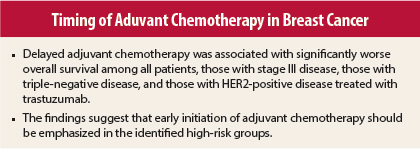In a study reported in the Journal of Clinical Oncology, de Melo Gagliato et al from The University of Texas MD Anderson Cancer Center, Houston, assessed the association between time to adjuvant chemotherapy and survival in breast cancer patients.1 They found that delay of therapy is associated with significantly poorer overall survival in all patients, stage III disease, triple-negative disease, and HER2-positive disease treated with trastuzumab (Herceptin).
Mariana Chavez Mac Gregor, MD, MSc, Assistant Professor in the Department of Breast Medical Oncology at MD Anderson, was the corresponding author for the study.
Study Details
The study involved 6,827 patients diagnosed with stage I to III breast cancer between 1997 and 2011 who received adjuvant chemotherapy at MD Anderson Cancer Center. Outcomes were analyzed according to initiation of adjuvant chemotherapy at < 30 days, 31 to 60 days, and ≥ 61 days after definitive surgery.
Among the 6,827 patients, time to adjuvant chemotherapy was < 30 days in 2,716 (39.8%), 31 to 60 days in 2,994 (43.8%), and ≥ 61 days in 1,117 (16.4%). Overall, 84.5% had stage I to II disease and 15.5% had stage III disease. There were no differences in time to chemotherapy between patients who underwent breast-conserving surgery and those who underwent mastectomy (P = .83) and no association between number of comorbidities and time to chemotherapy (P = .6). After a median follow-up of 59.3 months, 1,437 patients (21.0%) had died, 2,135 (31.3%) had developed a recurrence, and 1,924 (28.2%) had distant recurrence.
Associations With Survival
Among all patients, there were no significant differences among the < 30, 31 to 60, and ≥ 61 day groups with regard to 5-year overall survival (85%, 83%, 83%; P = .54), recurrence-free survival (69%, 69%, 68%; P = .67), or distant recurrence-free survival (73%, 72%, 71%; P = .48).
Significant differences in all three outcomes by time to chemotherapy were observed for race/ethnicity, pathologic tumor size, pathologic nodal status, cancer subtype (hormone receptor–positive, HER2-positive, or triple-negative), nuclear grade, lymphovascular invasion status, type of surgery, and number of comorbidities.
Poorer Overall Survival
There were no significant differences among the < 30, 31 to 60, and ≥ 61 day groups with regard to overall survival, recurrence-free survival, or distant recurrence-free survival among all hormone receptor–positive patients (n=3,834) or among all HER2-positive patients (n = 1,142).
However, 5-year overall survival significantly differed by time to chemotherapy among HER2-positive patients treated with trastuzumab (n = 591; 88% for < 30, 87% for 31–60, and 75% for ≥ 61 days; P = .01) and among patients with triple-negative disease (n = 889; 70% for < 30, 59% for 31–60, and 67% for ≥ 61 days; P = .004). There were no significant differences in recurrence-free survival or distant recurrence-free survival in these two subgroups according to time to chemotherapy.
Adjusted Analysis
On multivariate analysis adjusting for age, race/ethnicity, axillary node involvement, tumor size, tumor grade, surgery, lymphovascular invasion, number of comorbidities, type of chemotherapy in patients with triple-negative disease, and use of trastuzumab in HER2-positive patients, initiation of chemotherapy at ≥ 61 days vs < 30 days was associated with significantly worse overall survival among all patients (hazard ratio [HR] = 1.19,
P = .03).
Initiation of adjuvant chemotherapy ≥ 61 days vs < 30 days after surgery was also associated with significantly worse distant recurrence-free survival in patients with stage II disease (HR = 1.20, P = .03) and significantly worse overall survival (HR = 1.76, P < .001), recurrence-free survival (HR = 1.34, P = .04), and distant recurrence-free survival (HR = 1.36, P = .03) in patients with stage III disease.
In addition, patients with triple-negative disease who initiated treatment at 31 to 60 days (HR = 1.74, P < .001) or ≥ 61 days vs < 30 days (HR = 1.54, P = .02) had significantly worse overall survival, as did HER2-positive patients receiving trastuzumab who initiated chemotherapy at ≥ 61 days vs < 30 days (HR = 3.09, P = .002).
The investigators concluded:
[W]e demonstrated that delaying the initiation of adjuvant chemotherapy was associated with worse [breast cancer] survival outcomes and that the clinical impact varies according to the stage and the [breast cancer] subtype. Early initiation of adjuvant chemotherapy is particularly relevant for patients with advanced-stage [breast cancer] at diagnosis, and those with [triple-negative breast cancer] and trastuzumab-treated HER2-positive tumors. The adverse outcomes occurred when chemotherapy was delayed ≥ 61 days, which in most circumstances, gives medical oncologists enough time to initiate adjuvant chemotherapy. Among patients with stage II and III [breast cancer], [triple-negative breast cancer], and HER2-positive tumors, every effort should be made to avoid postponing the initiation of adjuvant chemotherapy. This may lead to an improvement in outcomes for these subsets of patients. ■
Disclosure: The study was supported by the National Cancer Institute, a Komen for the Cure Catalyst Award, and the American Cancer Society. For full disclosures of the study authors, visit jco.ascopubs.org.
Reference
1. de Melo Gagliato M, Gonzalez-Angulo AM, Lei X, et al: Clinical impact of delaying initiation of adjuvant chemotherapy in patients with breast cancer. J Clin Oncol. January 27, 2014 (early release online).



